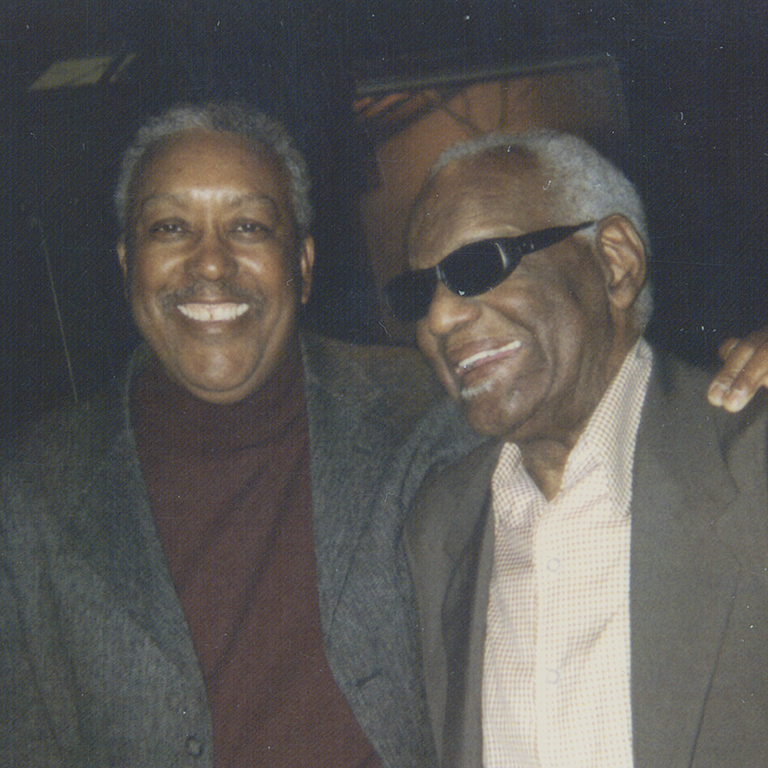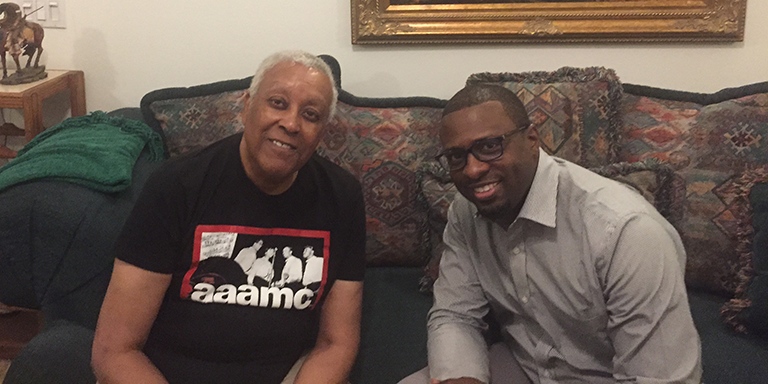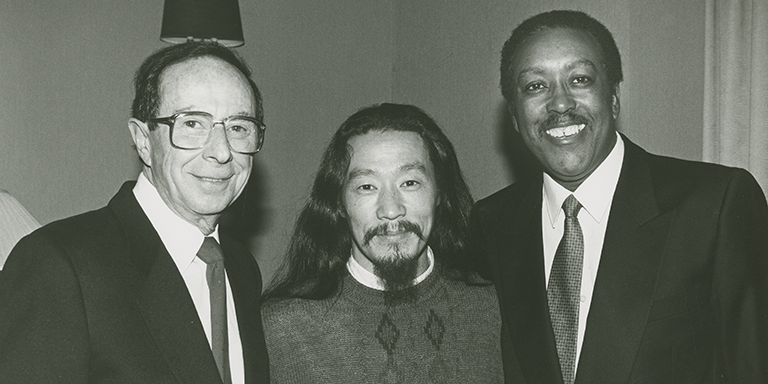Description of the video:
[Music: Funk Music Plays]
[Text appears: an animation of the acronym “AAAMC” appears one letter at a time, spelling out “The Archives of African American Music and Culture]
[Video: The IU trident logo appears in the bottom right corner. A yellow tinted picture of Eddie Gilreath with band Rose Royce appears on left side of screen]
[Audio: Voice of Announcer says: The message is clear. Black-oriented music is fast becoming everybody's music.]
[Video: A purple tinted photo of Dr. Portia Maultsby at an electric piano appears on right side of screen]
[Audio: Gospel choir singing “Amazing Grace” fades in]
[Audio: Choir Leader exclaims: Amazing Grace!]
[Audio: Flute and piano fade in]
[Voice: Evelyn Simpson Curenton speaks: I would hope that my life would be an inspiration.]
[Video: A Yellow tinted photo of Evelyn Simpson Curenton in a newspaper ad appears]
[Voice: Jill Scott says: Mr. Michael Burton!]
[Audio: Mike Burton plays a saxophone solo]
[Video: A purple tinted photo of Mike Burton playing saxophone appears]
[Voice: Eddie Gilreath says: It was history that we were working with...]
[Video: A yellow tinted photo of Reggie Workman playing bass appears]
[Voice: Reggie Workman speaks: they had never experienced before, The music went so high!]
[Audio: A cymbal crash cuts off all other audio]
[Video: a white flash consumes whole frame, leaving a black screen]
[Music: A singing woman’s voice fades in]
[Voice: Tyron Cooper says: I want you to know these people have impacted the world.]
[Video: Reveal Tyron Cooper sitting surrounded by archival materials boxed up on shelve]
[Video: Cuts to four newspaper clippings that appear one on top of another]
[Music: Piano plays, drum hits with each newspaper]
[Voice: Tyron: We do so much valuable work, I think so much work that is not only meaningful to the Black community in terms of preserving their legacy. But also meaningful to the larger society in terms of understanding the significance of Black people.]
[Video: Tyron sitting surrounded by archival materials boxed up on shelves, cut to video of a person going through archival materials on a table. Video flashes, transitioning to a person sitting in front of a projector, watching Evelyn Simpson Curenton perform for a Dorothy Height tribute]
[Voice: Tyron speaks: I think these collections matter because they actually can galvanize people around understanding each other.]
[Video: Different shots of archival materials reveal archive collection examples like “Jack Gibson”, “Marietta Simpson”, and “Regina Jones”. Cuts to Tyron Cooper pulling a vinyl record out of an archive shelf to examine it]
[Voice: Dr. Portia Maultsby Speaks: So I became more interested in looking at the roots, the source of this aesthetic. You know, how can we really talk about African heritage.
[Video: Dr. Portia Maultsby sits in her office over a Zoom meeting recording]
[Voice: And I knew I wanted to have a focus in the areas that were largely omitted from other archives.]
[Video: Tyron Cooper is seen walking in front of the Musical Arts Center entrance. Cuts to vide of Tyron interviewing Dr. Maultsby on the Musical Arts Center stage. Cuts to video of Mike Burton sitting in his office on a Zoom meeting. Cuts to video of Tyron interviewing Mike Burton from inside the Neal-Marshall Black Culture Center]
[Voice: Tyron Cooper says: I chose these folk because of the contributions that they have and that they are making. The moment, right now!]
[Video: Quick cuts between an archival slide photo of Dr. Maultsby and the Soul Syndicates band, phone video of Mike Burton performing a sax solo on stage, cuts to video of Evelyn Simpson Curenton bowing behind a piano to a clapping crowd]
[Audio: The click of a slide projector is heard when Dr. Maultsby’s photo is revealed. A saxophone solo with crowd cheering is heard with Mike Burton’s sax video. Clapping is heard when Evelyn Simpson Curenton bows]
[Voice: Tyron speaks: Not only the history, not only the trajectory of their development, but right now, is historical.
[Video: AAAMC staff members examine Eddie Gilreath’s archival photos.]
[Voice: Tyron speaks: So it's important that as you engage any collection at the Archives, that it be ongoing. Just like life.]
[Video: Tyron sitting surrounded by archival boxes, a side profile angle.]
[Voice: Tyron speaks: Therefore, "AAAMC Speaks," as our collections come alive]
[Video: Tyron sitting surrounded by archival boxes, a centered wide shot]
[Voice: Tyron speaks: and African American legacies are preserved.]
[Video: A paint-brushed purple appears over the screen. A yellow speech bubble graphic opens up on the frame. Text appears: AAAMC Speaks. Parentheses appear, spelling out Archives of African American Music and Culture. Text appears: An Indiana University Documentary Series. Text appears: Coming soon.]
[Video: Previous graphic fades out, new graphic of Indiana University’s name and trident fade in. Text appears, aaamc.indiana.edu]
[Audio: Piano and vocals slowly fade out]
Each episode is about 20 minutes and focuses on highlights from the archives along with an interview with a Black music industry scholar, musician, or industry professional on the guest’s own legacy and ongoing role in the culture. The docuseries helps convey the depth and breadth of the archives’ materials—including valuable audio, video, and printed materials (including such items as performance posters and programs, original song lyrics, and sheet music)—highlighting the significance of Black music in shaping other genres of music and American culture in general.
In episode one, which debuts Feb. 12 at 7 p.m. EST on IU Bloomington’s YouTube channel, Cooper interviews Eddie Gilreath, an industry veteran and executive whose 50+-year career has included working with such record labels as Motown, Warner Bros, Geffen, and Island Records. When he started out in the field, Gilreath was one of very few Black executives in the music industry. He went on to work with top musicians from multiple genres including The Jackson Five, Frank Sinatra, Ray Charles, U2, Aerosmith, George Benson, Al Jareau, Bob Marley, Kitaro, The Staple Singers, Curtis Mayfield, Pat Matheny, Bonnie Raitt, Tracy Chapman, Meatloaf, George Clinton, and James Taylor.
Gilreath said he and Cooper connected in about 2018, at the culmination of his career. “I found that I wasn't quite finished as of yet,” Gilreath said. As the two talked more and got to know each other, Cooper asked if Gilreath would consider housing some of the materials from his illustrious career at AAAMC. “I was not only beyond satisfied with how they treat and maintain their collection, I was humbled that they thought that I was worthy to be part of it,” he said. Gilreath is certain that the “AAAMC Speaks” docuseries will inspire and educate future generations on some of the music industry’s most important artists and historical figures. “I am extremely proud to say that I was part of this extraordinary effort.”
The series is an example of advances IU’s commitment to expanding and showcasing diversity, equity, and inclusion initiatives and representation.
“AAAMC Speaks” offers a tangible means for a deeper understanding of race, gender, representation, and identity within the Black community as communicated through musical expression.
Co-director of the project Ethan Gill said that archives typically play a supporting role in providing source materials for documentaries. “I have yet to find a documentary series about an archive and their holdings,” Gill said. “What we’re producing feels unique in the academic and research world. My goal for 'AAAMC Speaks’ is to present these significant characters and their legacies in an informative, entertaining, and celebratory way. It also excites me knowing that these documentaries can help further students’ understanding of the industry and their contributions to society.”
A virtual YouTube watch party will accompany the releases, which will go live at the end of each month from February to May 2021, with two in February to celebrate Black History Month. Future episodes feature composer and musician Evelyn Simpson-Curenton, whose work has been commissioned by Carnegie Hall and performed all over the world, including by notable legend Duke Ellington; alto saxophonist Michael Burton, who has worked with Jill Scott, Patti LaBelle, Mary J. Blige, New Edition, and Anita Baker and performed on the “Tonight Show,” “Good Morning America,” “The Steve Harvey Show,” “Ellen,” and “Jimmy Kimmel Live;” IU’s own Portia Maultsby, the Laura Boulton Professor Emerita of Ethnomusicology in the Department of Folklore and Ethnomusicology and founding director of both the AAAMC and the IU Soul Revue; and avant-garde jazz and hard bop double bassist Reggie Workman, who was a member of the John Coltrane Quartet in the early 1960s.





